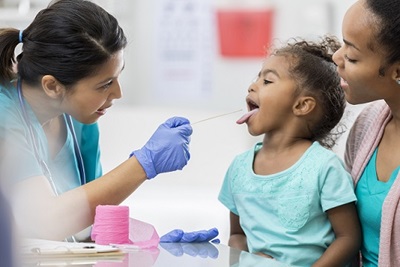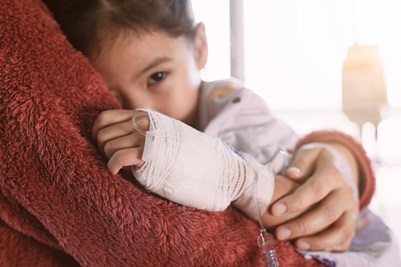It's the middle of the night, and your child is howling in pain with an earache, a tummy ache, or a fever. You can forget about sleep, because you know your child needs medical care — now. But where should you take them?
Urgent Care vs. Emergency Room: How Do I Choose?

If your child needs immediate medical care and can't wait until the next available appointment with their pediatrician, there are two options: urgent care or the emergency room.
"I always encourage parents to call their child's physician if they can't decide. The physician or on-call provider can help determine where to take your child, or may even be able to help avoid a trip to urgent care or the emergency room altogether," says Carol Curley, MD, FAAP, Medical Director, CHOP Care Network - West Chester.
When to Go to the Pediatrician
Call your pediatrician's office first, even if it's after hours. The on-call provider can help you decide what to do. Symptoms that can usually wait include:
- Cough
- Runny nose
- Vomiting
- Diarrhea
- Fever in a child age 1 or over
- Minor ear aches, stomachaches, or sore throats
When to Go to Urgent Care
Urgent care is for injuries and illnesses that aren't serious but need care right away. Children often go to urgent care centers for:
- Pink eye
- Minor asthma
- Sprains and strains
- Minor burns and small cuts
- Minor illnesses, like strep throat or ear infection
- Worsening fever in infants (2 months to 1 year)
- Broken bones that aren't crooked or causing severe pain
When to Go to the Emergency Room
The emergency room is for severe or life-threatening injuries and illnesses. Take your child there right away if they have these symptoms:
- Seizures
- Uncontrolled pain
- Blue or purple skin, lips, or fingernails
- Difficulty breathing or shortness of breath
- Head, eye, or spinal cord injuries
- Fever (infants under 2 months)
- Pain or pressure in the stomach or chest
- Allergic reaction signs (face swelling, fainting, or hives)
**Look for pediatric urgent care centers or emergency departments with strong pediatric programs. The staff at these facilities are experts at working with children.
Chester County Hospital is affiliated with Children's Hospital of Philadelphia (CHOP). Our young patients can be seen at any of CHOP's urgent care locations. We also have CHOP pediatricians right here at Chester County Hospital's emergency department.**

Here are 7 times when you may need to bring your child to the emergency room.
1. If They Have a Head Injury
Minor head injuries, where your child isn't in pain and is acting normally, don't always require rushing out the door.
However, bring your child to the emergency room right away if they have any of these symptoms:
- Loss of consciousness
- Seizures
- Severe pain or excessive swelling in the injured area
- Persistent vomiting
- Numbness or weakness in the arms or legs
These could be signs of traumatic brain injury — brain damage that could be permanent or even life-threatening:
2. If They Have a Serious Injury
Falls, scrapes, and bruises are normal, so don't panic if your child takes a little tumble on the soccer field.
Your child may need emergency care if their injury causes:
- Pain in a bone or joint that won't go away with normal comfort measures, such as ice or rest
- Numbness or change in sensation
- Changes in skin color. This could signal problems with blood flow
- A wound that's longer than a centimeter (about the width of your fingernail) or wider than a grain of rice
- Difficulty moving the arms or legs, or bearing weight
- A dislocated joint
- A large burn or a burn that has blistered
Some smaller injuries, like a twisted ankle or a minor burn, can often be treated at an urgent care clinic.
3. If They're Having Trouble Breathing
If your child is struggling to breathe for no reason, or their breathing seems loud, fast, or labored, it could be a medical emergency that needs a trip to the ER.
Call 9-1-1 right away if your child stops breathing completely or their breathing problem seems severe.
Take your child to the emergency room if they:
- Have stridor (very noisy breathing), especially if they have croup — an illness that causes swelling in the throat and a barking cough
- Can't catch their breath
- Have grayish or bluish tongue, lips, or skin
- Their chest looks like it's sinking in below the neck or under the breastbone with each breath
4. If They Have a High Fever and ...
A fever is the body's response to something (typically an illness), not an illness itself. And while a fever can be scary, it's generally not an emergency — in fact, there's even evidence that fevers can fight off infection and help the body recover faster from sickness.
However, there are a few times when a fever could be serious. Take your child to the emergency room if they have a fever and:
- Are less than 3 months old and have a rectal temperature of over 100.4°F
- Have an underlying medical condition, such as a heart defect, or problems with their immune system
- Have a stiff neck or bad headache
- Developed the fever after exposure to heat, like sitting in a hot car or exercising on a hot day
But in the end, there's no steadfast rule. Trust your instincts and get your child care if you feel they need it.
"We always say, 'How your child looks is most important, not the number on the thermometer.' If the fever is in the context of an illness, pay attention to how your child is drinking, urinating, acting, and breathing. If you're concerned about your child's symptoms, don't hesitate to call their provider," says Dr. Curley.
5. When They've Accidentally Swallowed Something — Especially If It Could Be Poisonous
Children love putting things in their mouths. It's a fact of life. Unfortunately, many things they like to drink or munch on can be poisonous, such as:
- Medications
- Cleaning products
- Antifreeze
- Pesticides
- Gasoline
- Batteries: These can get stuck in your child's esophagus and cause burns or even become life-threatening. If they have swallowed a battery, call the National Battery Ingestion Hotline at 800-498-8666 immediately.
If your child has swallowed something that could be poisonous, call Poison Control at 800-222-1222 immediately — even if they aren't showing any symptoms. Poison Control is a great place for parents to start. They will give you great guidance about what to do next and let you know if you need to go to the emergency room.
And if your child isn't breathing, is unconscious, or is having seizures, call 9-1-1 instead of driving them yourself. They may need care from emergency medical technicians (EMTs) along the way.
6. If They Have Certain Chronic Conditions
Long-lasting conditions, such as constant headaches, typically don't need emergency care, unless there's a major change in their condition or something out of the ordinary occurs.
Work with your child's physician to get an emergency plan in place. For example, if your child has frequent seizures, their physician might say they only need emergency care if the seizure lasts longer than 5 minutes or if they have multiple seizures in a row.
7. When You Aren't Sure What's Wrong — but You Know It's Something Serious
Follow your gut. If you sense that something serious is wrong with your child, don't let anyone talk you out of how you feel. It's best to call your doctor and get confirmation that everything is fine than to ignore your hunch and be wrong.
Get your child emergency care right away if they have:
- Severe, unexplained pain
- Sudden confusion or difficulty speaking, moving, or seeing
- Weakness or dizziness that won't go away
- Bloody vomit, or are coughing up blood
- A potential allergic reaction, such as hives or feeling like their throat is closing up
- Severe chest pain or pressure
Should I Call an Ambulance?
Time to revisit the ABCs.
"If your child has a problem with their Airway, Breathing, or Circulation, the issue could be life-threatening. When you call an ambulance, emergency medical technicians (EMTs) can perform immediate, life-saving measures while they are on the way to the hospital with your child," says Dr. Curley.
Call 9-1-1 instead of driving your child to the hospital yourself if they have:
- Unstable breathing — or if they have completely stopped breathing
- Uncontrolled seizures
- A head injury that causes confusion or passing out
- Severe allergic reactions
- A neck injury
- Severe chest pain or pressure
Remember — whenever you're in doubt, it's always okay to call your child's provider. Also, make an appointment with your child's doctor or health care provider after the urgent care or emergency room visit. That way, they know what treatments your child received and can help your child recover.
Call your child's pediatrician with any questions about when and where to bring your child for medical care.